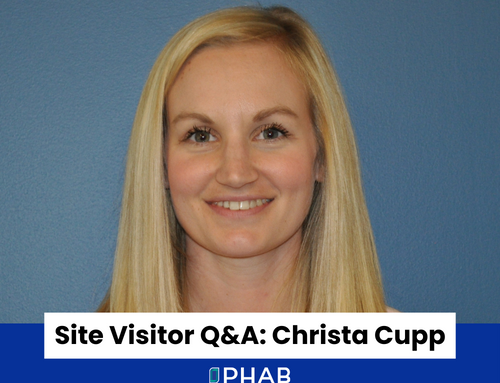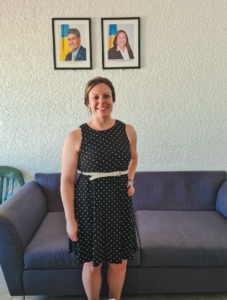 In April 2024, Chelsey Saari, DrPH, Senior Accreditation Specialist at PHAB, visited Palau to support the Palau Ministry of Health and Human Services, Bureau of Public Health (the Ministry) through the Readiness Assessment process. This visit was a component of PHAB’s response to Palau’s technical assistance requests through the Public Health Infrastructure Grant (PHIG), in which PHAB is one of three national partners providing technical assistance to grantees. Dr. Saari spent three full days in Palau working with a team of Ministry staff and leaders to complete the PHAB Readiness Assessment and identify actionable next steps to ensure delivery of the Foundational Capabilities in their community.
In April 2024, Chelsey Saari, DrPH, Senior Accreditation Specialist at PHAB, visited Palau to support the Palau Ministry of Health and Human Services, Bureau of Public Health (the Ministry) through the Readiness Assessment process. This visit was a component of PHAB’s response to Palau’s technical assistance requests through the Public Health Infrastructure Grant (PHIG), in which PHAB is one of three national partners providing technical assistance to grantees. Dr. Saari spent three full days in Palau working with a team of Ministry staff and leaders to complete the PHAB Readiness Assessment and identify actionable next steps to ensure delivery of the Foundational Capabilities in their community.
Dr. Saari shares reflections from her time in Palau working with the Ministry, from the unique public health challenges in the Pacific Islands to how PHAB’s tools and resources can support the great efforts already taking place.
The week I spent in Palau with the Ministry was enlightening, productive, and truly memorable. Our activities were anchored in completing the PHAB Readiness Assessment, focusing on the Foundational Capability (FC) measures in the PHAB Standards & Measures for Initial Accreditation (v2022). Over three days, we identified strengths to leverage and gaps to address and made significant progress in establishing a clear path forward to improve and strengthen public health infrastructure in Palau’s public health system.
Day One: Setting the Tone
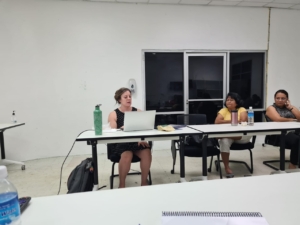 The first day in Palau began with a Monday afternoon meeting with the Ministry team, but not without a few hiccups. Despite mapping my route and arriving early at Belau National Hospital in Koror, I struggled to locate the meeting room. After some initial confusion and wandering the humid campus, I finally found the building and received a warm welcome from the Ministry.
The first day in Palau began with a Monday afternoon meeting with the Ministry team, but not without a few hiccups. Despite mapping my route and arriving early at Belau National Hospital in Koror, I struggled to locate the meeting room. After some initial confusion and wandering the humid campus, I finally found the building and received a warm welcome from the Ministry.
Our first interaction set the tone for the rest of our time together – productive, engaging, and truly memorable. The agenda began with introductions, followed by an overview of PHAB’s Readiness Assessment process, Pathways Recognition, and Accreditation. We also discussed Palau’s current public health system and the Ministry’s structure, authorities, programs, and services, including their deep integration with the healthcare system in Palau. The team was active, engaged in our conversations, and seemed excited to begin the work toward accreditation readiness.
Day Two: Beginning the Readiness Assessment
On day two, we began the formal Readiness Assessment process, including an overview of the Foundational Capabilities (FCs) as described in the PHAB Standards & Measures. We walked through each FC and discussed the ‘headline responsibilities’ from the Foundational Public Health Services framework. We then used the Readiness Assessment tool to review specific PHAB requirements, determining whether the Ministry currently has each practice, policy, or process in place. As we completed this activity, the Ministry team brainstormed and documented what practices, policies, or processes existed, where there were gaps, and topics/areas they needed to explore further.
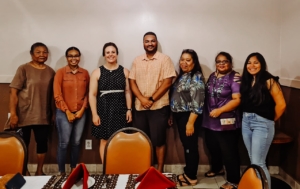 This work prompted the Ministry team to think critically about their existing resources and how they could be leveraged and maximized. For example, when we discussed the FC measures for Domain 1 (relating to Assessment and Surveillance), the team mentioned several primary data sources they planned to incorporate in a revised community health assessment (CHA). I offered suggestions and guidance for creating efficiencies in addressing other measure requirements in Domain 1 using these same data collection efforts. At the end of this day, despite the immense amount of brain power drained, the Director of Public Health at the Ministry described the process as ‘fun.’ Jokingly, I told her I should have recorded a statement for marketing the Readiness Assessment!
This work prompted the Ministry team to think critically about their existing resources and how they could be leveraged and maximized. For example, when we discussed the FC measures for Domain 1 (relating to Assessment and Surveillance), the team mentioned several primary data sources they planned to incorporate in a revised community health assessment (CHA). I offered suggestions and guidance for creating efficiencies in addressing other measure requirements in Domain 1 using these same data collection efforts. At the end of this day, despite the immense amount of brain power drained, the Director of Public Health at the Ministry described the process as ‘fun.’ Jokingly, I told her I should have recorded a statement for marketing the Readiness Assessment!
Day Three: Developing a Workplan
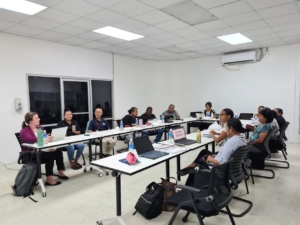 We continued working through the FC measures in the Readiness Assessment and only had about a half day left once that process was complete. I offered the team a few options for how they wanted to use this time to ensure they would walk away from my visit with what they felt would be most impactful for the Ministry’s ongoing infrastructure improvements. Collectively, they decided to have me facilitate a planning session to create a workplan for addressing the gaps identified through their FC Readiness Assessment.
We continued working through the FC measures in the Readiness Assessment and only had about a half day left once that process was complete. I offered the team a few options for how they wanted to use this time to ensure they would walk away from my visit with what they felt would be most impactful for the Ministry’s ongoing infrastructure improvements. Collectively, they decided to have me facilitate a planning session to create a workplan for addressing the gaps identified through their FC Readiness Assessment.
I pulled together a list of measures that were identified in the Readiness Assessment as gaps and created a prioritization matrix with categories of ‘quick wins’ and ‘longer-term projects.’ I facilitated the Ministry’s team by discussing and categorizing their gaps and then discussing each measure. This resulted in a work plan for each measure that outlined tasks to complete, lead staff, completion timelines, and success measures for each measure.
Final Day: A Tour of Palau’s Public Health System
We finished the work plan on the final day, stepped outside in the sun for a few photos, and said goodbye to the full Ministry team. A Ministry team member took me on a tour of some key Ministry of Health and Human Services facilities, including the central health center, which delivers a wide range of public health clinic services, and the hospital. Both were undergoing renovations due to storm damage. The hospital administrator highlighted staffing and workforce challenges, which the public health team also faces.
That evening, I met with public health team members and the Minister of Health for dinner. We discussed the Ministry’s readiness for accreditation and progress over the week. It was a wonderful end to my visit. 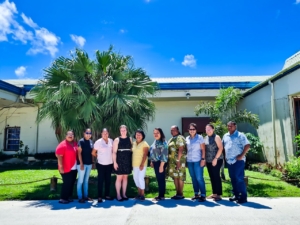
Reflections and Next Steps
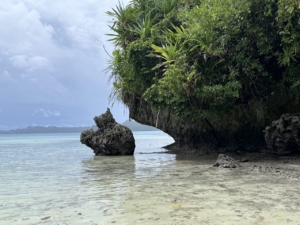 The next steps in the accreditation journey are up to the Ministry of Health and Human Services. However, I am energized, optimistic, and excited about the Ministry’s path forward. The team is committed to strengthening and improving the public health system in Palau and has the growth mindset to accomplish the task.
The next steps in the accreditation journey are up to the Ministry of Health and Human Services. However, I am energized, optimistic, and excited about the Ministry’s path forward. The team is committed to strengthening and improving the public health system in Palau and has the growth mindset to accomplish the task.
Becoming an accredited health department is challenging even for well-resourced departments, and places like Palau face additional, unique capacity and resource constraints despite strong leadership and desire. PHAB’s decision to send a staff member to Palau to support the Ministry in their assessment and work planning for accreditation demonstrated our commitment to equity in practice. Investing in explaining PHAB requirements, prioritizing gaps, and supporting planning discussions added significant value to the Ministry’s ongoing efforts. This support resulted in a feasible and flexible plan for the Ministry, aiming for accreditation by the end of the PHIG grant cycle. The experience also enriched PHAB’s understanding of Palau’s unique systems and challenges, aiding support for other US-Affiliated Pacific Islands and informing PHAB’s growth of accreditation products.
Chelsey Saari, DrPH, MPH
Sr. Specialist, Accreditation Product Development and Data Systems Research and Product Development



